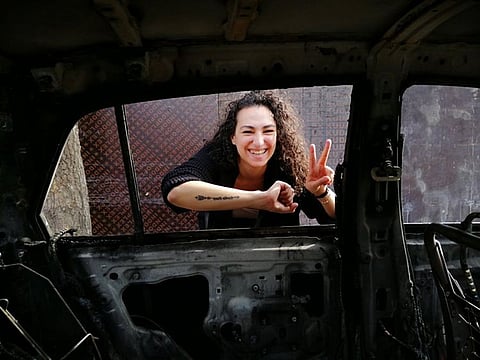Lebanese protester’s car was set on fire. But she chose to smile.
Fundraising campaign raises $10,000 for Merhi to buy a new car

Also In This Package
Beirut: When a young Lebanese protester’s car was set on fire by Hezbollah and Amal supporters, Farah Merhi did not get upset—instead she took a picture with her car and smiled.
“You burned my car, but you will never burn my smile!” she captioned the picture and posted it on social media.
Little did she know that the image would go viral with thousands of people sharing it.
Lebanese have been protesting against their leaders since October 17.
They accuse them of being corrupt and want the ruling elite to step aside and let a technocrat government take over.
However, Hezbollah and Amal, Shiite groups with strong links to Iran, have sent their supporters to clash with protesters on several occasions.
While the protesters have been overwhelmingly peaceful, violence has been provoked by such groups which do not want to see the fall of the government.
Merhi, who works as an accountant, had parked her Nissan Tida near Martyrs Square to attend a recent protest with her friends.
After scuffles broke out and started getting more dangerous, she couldn’t reach her car due to road closures.
The following day when she returned she discovered the charred remains of her car.
After she posted the image on social media, one Lebanese citizen, Layal Ghosn, decided to launch a fundraising campaign for Merhi to help her buy a new car.
In less than 48 hours, the campaign raised $10,000 for Merhi.
Speaking to Gulf News, Merhi said that she is a positive person by nature.
“When you have faith you will get what you deserve. I trust in nature and I know that it will always be beside me. That is why I smiled,” she said.
“Thankfully me or my friends weren’t hurt and it was only a material loss,” she added.
“I don’t hate the arsonist, on the contrary, I smiled because I wanted to deliver a message to the world that life goes on.”
-With inputs from Layelle Saad, Middle East Editor
Sign up for the Daily Briefing
Get the latest news and updates straight to your inbox



